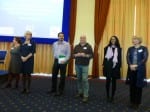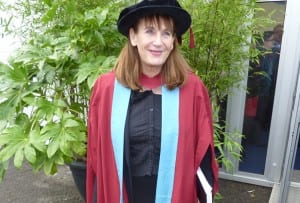 Jolien Vos has joined the Community and Health Research Unit this semester as a graduate research assistant and doctoral student. She came from Belgium to the UK at the end of September 2013 to join CaHRU in the University of Lincoln’s School of Health and Social Care. Jolien is currently undertaking a PhD funded by a College of Social Science Scholarship, primarily supervised by Dr Karen Windle and Prof Niro Siriwardena. Her doctoral studies are exploring the area of ICT use and its potential to improve the care for elderly with multiple morbidities. Alongside her PhD, she is also supporting the Clinical trial for elderly patients with Multiple Disease (CHROMED) study.
Jolien Vos has joined the Community and Health Research Unit this semester as a graduate research assistant and doctoral student. She came from Belgium to the UK at the end of September 2013 to join CaHRU in the University of Lincoln’s School of Health and Social Care. Jolien is currently undertaking a PhD funded by a College of Social Science Scholarship, primarily supervised by Dr Karen Windle and Prof Niro Siriwardena. Her doctoral studies are exploring the area of ICT use and its potential to improve the care for elderly with multiple morbidities. Alongside her PhD, she is also supporting the Clinical trial for elderly patients with Multiple Disease (CHROMED) study.
 Jolien did her undergraduate degree in Nursing at the K. H. Kempen University College in Lier. This was followed by an MSc in Health Promotion and Education (Prevention) at Ghent University. Her MSc mainly focused on interventions in health, public health, preventive medicine and health psychology, in which she explored the opinions of GPs in Flanders regarding the registration of risk factors for HIV in the (electronic) medical records. She continued at Ghent University for another year, working as a Research Assistant within the Communication in Health Care and Equity in Health Care research groups. Besides contributing to research within these groups, she supervised Masters students with their dissertations and taught Communication in Health Care to Medical and Dentistry students.
Jolien did her undergraduate degree in Nursing at the K. H. Kempen University College in Lier. This was followed by an MSc in Health Promotion and Education (Prevention) at Ghent University. Her MSc mainly focused on interventions in health, public health, preventive medicine and health psychology, in which she explored the opinions of GPs in Flanders regarding the registration of risk factors for HIV in the (electronic) medical records. She continued at Ghent University for another year, working as a Research Assistant within the Communication in Health Care and Equity in Health Care research groups. Besides contributing to research within these groups, she supervised Masters students with their dissertations and taught Communication in Health Care to Medical and Dentistry students.












